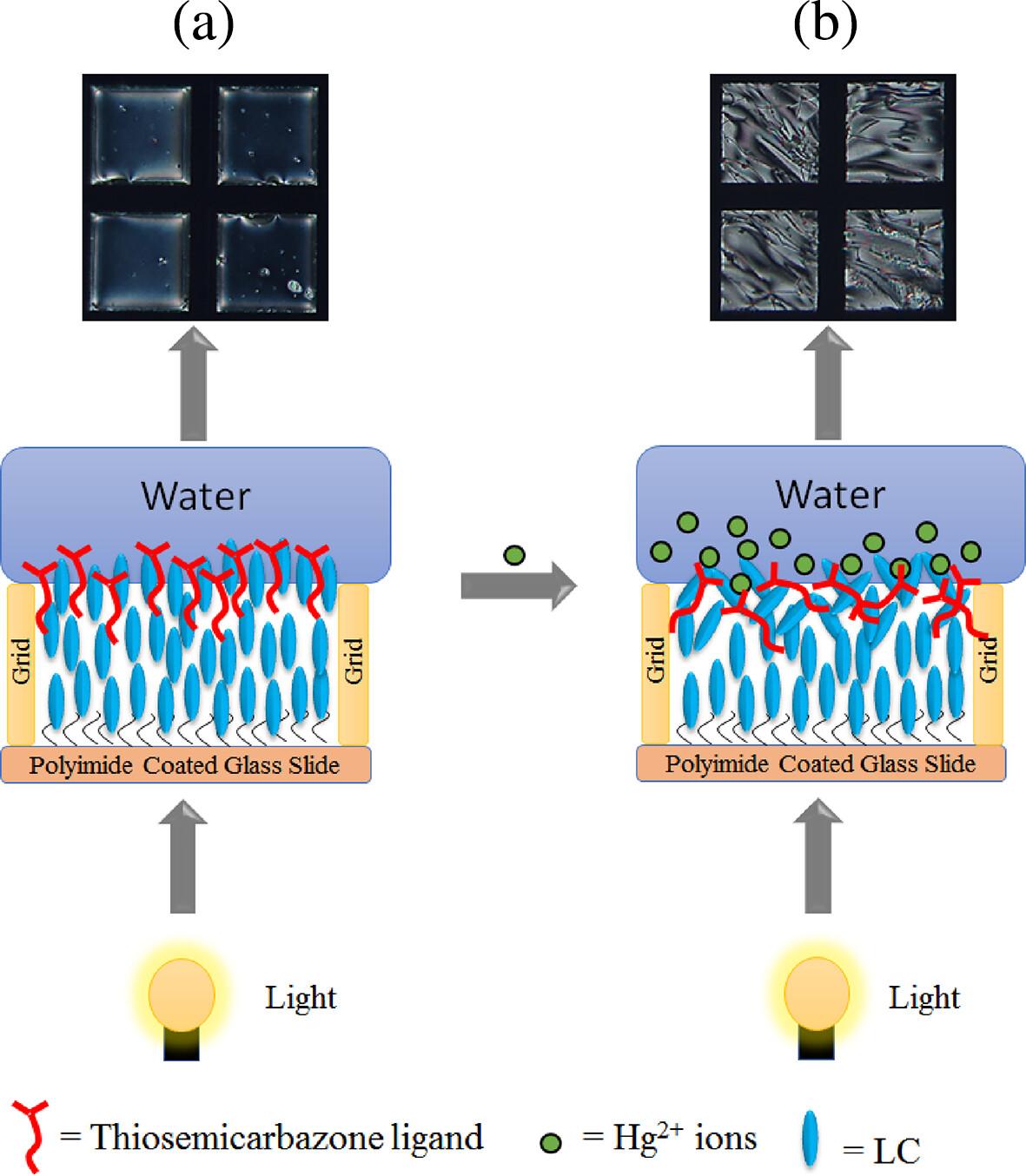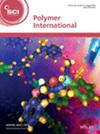求助PDF
{"title":"Amphiphilic ligand-doped liquid crystal-based detection of Hg2+ ions on polyimide surface with alkyl pendent groups","authors":"Nasir Majeed, Humaira Masood Siddiqi, Iqra Urooj, Faroha Liaqat","doi":"10.1002/pi.6684","DOIUrl":null,"url":null,"abstract":"<p>In this study, amphiphilic thiosemicarbazone was used to align liquid crystal (4-cyano-4′-pentylbiphenyl) in a homeotropic way on polyimide containing alkyl pendent groups (AHDPI), which was coated on a glass slide. The amphiphilic ligands 2-(4-(dodecyloxy)benzylid-ene)hydrazine-1-carbothioamide (DT) and 2-(1-dodecyl-2-oxoindolin-3-ylidene)hydrazine-1-carbothioamide (IT) were doped with liquid crystal (LC) to develop LC-based sensors to detect Hg<sup>2+</sup> ions in water. The selective interaction of carbothioamide with Hg<sup>2+</sup> ions triggered the orientation transition of LC from homeotropic to parallel alignment and gave dark to bright optical signal at the LC/aqueous interphase. Self-immobilization of thiosemicarbazone-based ligands on AHDPI-coated glass slide can be used to detect Hg<sup>2+</sup> ions with high sensitivity. The limit of detection with DT and IT was found to be 0.5 and 0.25 μmol L<sup>−1</sup>, respectively. Density functional studies were carried out to study the interaction of the thiosemicarbazone ligands with mercuric ions, resulting in highly negative binding energies of −1.55 and −2.06 eV for DT and IT with Hg<sup>2+</sup> ions, respectively. The chemical and thermal stability (up to 268 °C) of the AHDPI coated on glass slide made it reusable at least twice for sensor fabrication. This provides a quicker and cheaper alternative to traditional methods of sensor fabrication. © 2024 Society of Chemical Industry.</p>","PeriodicalId":20404,"journal":{"name":"Polymer International","volume":"73 12","pages":"1051-1062"},"PeriodicalIF":2.9000,"publicationDate":"2024-07-26","publicationTypes":"Journal Article","fieldsOfStudy":null,"isOpenAccess":false,"openAccessPdf":"","citationCount":"0","resultStr":null,"platform":"Semanticscholar","paperid":null,"PeriodicalName":"Polymer International","FirstCategoryId":"92","ListUrlMain":"https://onlinelibrary.wiley.com/doi/10.1002/pi.6684","RegionNum":4,"RegionCategory":"化学","ArticlePicture":[],"TitleCN":null,"AbstractTextCN":null,"PMCID":null,"EPubDate":"","PubModel":"","JCR":"Q2","JCRName":"POLYMER SCIENCE","Score":null,"Total":0}
引用次数: 0
引用
批量引用
Abstract
In this study, amphiphilic thiosemicarbazone was used to align liquid crystal (4-cyano-4′-pentylbiphenyl) in a homeotropic way on polyimide containing alkyl pendent groups (AHDPI), which was coated on a glass slide. The amphiphilic ligands 2-(4-(dodecyloxy)benzylid-ene)hydrazine-1-carbothioamide (DT) and 2-(1-dodecyl-2-oxoindolin-3-ylidene)hydrazine-1-carbothioamide (IT) were doped with liquid crystal (LC) to develop LC-based sensors to detect Hg2+ ions in water. The selective interaction of carbothioamide with Hg2+ ions triggered the orientation transition of LC from homeotropic to parallel alignment and gave dark to bright optical signal at the LC/aqueous interphase. Self-immobilization of thiosemicarbazone-based ligands on AHDPI-coated glass slide can be used to detect Hg2+ ions with high sensitivity. The limit of detection with DT and IT was found to be 0.5 and 0.25 μmol L−1 , respectively. Density functional studies were carried out to study the interaction of the thiosemicarbazone ligands with mercuric ions, resulting in highly negative binding energies of −1.55 and −2.06 eV for DT and IT with Hg2+ ions, respectively. The chemical and thermal stability (up to 268 °C) of the AHDPI coated on glass slide made it reusable at least twice for sensor fabrication. This provides a quicker and cheaper alternative to traditional methods of sensor fabrication. © 2024 Society of Chemical Industry.
基于两亲配体掺杂液晶的聚酰亚胺表面烷基悬垂基团 Hg2+ 离子检测技术
在这项研究中,两亲性硫代氨基甲酰肼被用于将液晶(4-氰基-4′-戊基联苯)同向排列在玻璃载玻片上的含烷基悬垂基团的聚酰亚胺(AHDPI)上。两亲配体 2-(4-(十二烷氧基)亚苄基)肼-1-硫代甲酰胺(DT)和 2-(1-十二烷基-2-氧代吲哚啉-3-亚基)肼-1-硫代甲酰胺(IT)被掺入液晶(LC)中,用于开发基于 LC 的传感器,以检测水中的 Hg2+ 离子。硫代甲酰胺与 Hg2+ 离子的选择性相互作用引发了液晶从顺向排列到平行排列的取向转变,并在液晶/水相间产生了由暗到亮的光学信号。硫代氨基脲配体自固定在 AHDPI 涂层玻璃载玻片上可用于高灵敏度地检测 Hg2+ 离子。DT 和 IT 的检测限分别为 0.5 和 0.25 μmol L-1。为了研究硫代氨基甲酸配体与汞离子的相互作用,对其进行了密度泛函研究,结果发现 DT 和 IT 与 Hg2+ 离子的结合能分别为-1.55 和-2.06 eV。涂在玻璃片上的 AHDPI 具有化学稳定性和热稳定性(高达 268 °C),因此至少可以重复使用两次,用于传感器的制造。这为传统的传感器制造方法提供了一种更快、更便宜的替代方法。© 2024 化学工业协会。
本文章由计算机程序翻译,如有差异,请以英文原文为准。


 求助内容:
求助内容: 应助结果提醒方式:
应助结果提醒方式:


